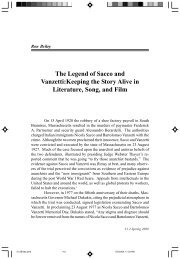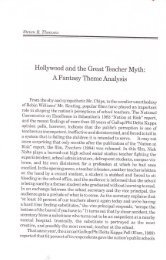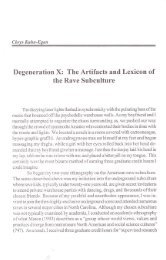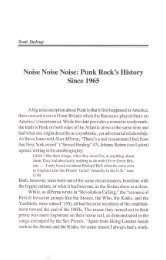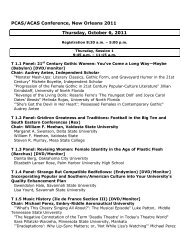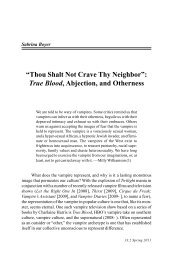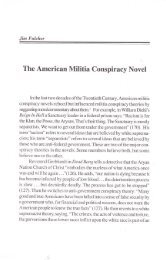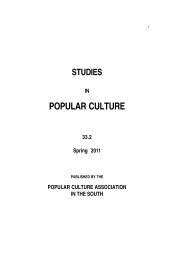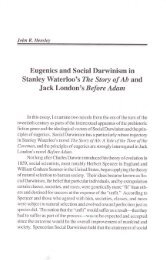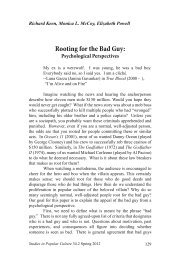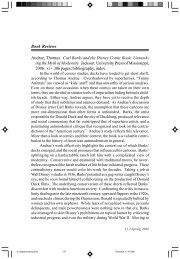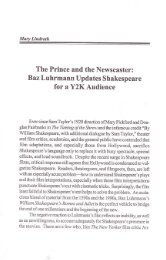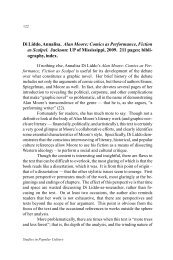Adapting Shakespeare for Star Trek and Star Trek for Shakespeare ...
Adapting Shakespeare for Star Trek and Star Trek for Shakespeare ...
Adapting Shakespeare for Star Trek and Star Trek for Shakespeare ...
Create successful ePaper yourself
Turn your PDF publications into a flip-book with our unique Google optimized e-Paper software.
The Klingon Hamlet <strong>and</strong> the Spaces of Translation 41<br />
difficult relationship of Benedick <strong>and</strong> Beatrice, now B’enerdik <strong>and</strong> B’eterirsh,<br />
serves as a model example of Klingon courting behaviour, while Hamlet’s,<br />
or Khamlet’s, story of revenge becomes “a chilling portrayal of malaise<br />
<strong>and</strong> decay” 22 <strong>and</strong> a study of “cultural dispossession”: “while he retains a<br />
sense of Klingon honour, Khamlet is culturally dispossessed, given to<br />
rationalising <strong>and</strong> talk instead of action … His development through the play<br />
is seen as a voyage back to his true Klingon roots, until, at the conclusion of<br />
the play, he dies in honour.” 23<br />
This playful redefinition <strong>and</strong> re-appropriation of <strong>Shakespeare</strong>an tradition<br />
is carefully developed within the translated text, weaving the characters<br />
<strong>and</strong> events of those classic texts with elements of <strong>Star</strong> <strong>Trek</strong>’s extended<br />
universe. The Klingon Hamlet relocates the main events of <strong>Shakespeare</strong>’s<br />
play to Kronos, the Klingon Home World, with Claudius (or tlhaw’DIyuS)<br />
turned into the Klingon Emperor, <strong>and</strong> Fortinbras of Norway (now vortIbraS)<br />
pictured as “the most insubordinate head of the House of Duras.” 24 Other<br />
places <strong>and</strong> characters undergo similar reimagining. The <strong>Star</strong> <strong>Trek</strong> context<br />
of the translated text becomes visible also in the sometimes very imaginative<br />
translations of particular lines or expressions. While the famous “What<br />
a piece of work is a man!” from Act II of Hamlet is literally (<strong>and</strong><br />
unsurprisingly) rendered as “A Klingon is an impressive specimen,” a playful<br />
exchange between the two Clowns in the first scene of Act V is reworked<br />
into a carefully designed word-play, making use of both a reference<br />
to <strong>Star</strong> <strong>Trek</strong>’s recurring humorous plot of “the trouble with tribbles” 25 <strong>and</strong> a<br />
more sophisticated linguistic pun. To quote both the original <strong>and</strong> the literal<br />
translation of this scene:<br />
--What is he that builds stronger than either the mason, the shipwright,<br />
or the carpenter?<br />
--The gallows maker; <strong>for</strong> that frame outlives a thous<strong>and</strong> tenants.<br />
--I like thy wit well, in good faith: the gallows does well; but how<br />
does it well? it does well to those that do ill: now thou dost ill to<br />
say the gallows is built stronger that the church: argal, the gallows<br />
may do well to thee …<br />
--Which of these is the most useful? the engineer, the communications<br />
officer, or the technician?<br />
--A tribble merchant. He is useful to regulate the tribble population<br />
....He buys (je’) hungry tribbles. If you don’t feed (je’) an<br />
entity (Dol), you’ll observe a funeral (nol). You can’t trade (bech)<br />
tribbles <strong>for</strong> food. There<strong>for</strong>e, you’ll suffer (Mech) from a large<br />
32.2 Spring 2010



